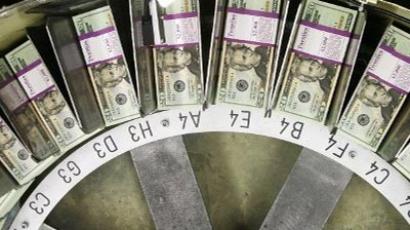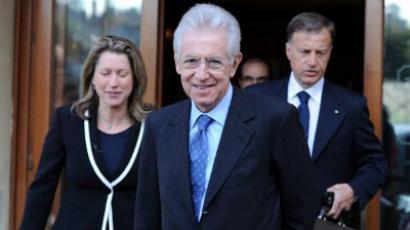‘Europe too slow to act on crisis’
Investors are losing faith that a solution to Europe’s debt crisis can be found as borrowing costs soared in almost all countries of the eurozone. And as Robert Oulds, chairman of the 'Bruges Group' think-tank told RT, euro economies are going backwards.
“The economies of the eurozone are failing, their growth is non-existent,” he said. “They are in a debt spiral and the lack of economic growth is not helping. The core of their problems is the euro. And there are serious economic difficulties which are not being cured once these countries remain within the EU’s single currency – the euro,” he added. This could affect the contagion everyone worries about. The countries that were thought to be free from risk, like France, are in trouble now, believes Oulds. “There is a chance France could lose its triple-A rating, which is a great deal of concern to the French economy and especially to President Sarkozy who could lose the presidential election this way,” Oulds explained. “The answer to their problems is to cut loose the countries that are struggling economically because of the euro, France being one of them. But the main focus is Italy and Greece. When those countries start to grow again we can have economic growth back in Europe, we can have hope that jobs can be created for EU citizens and the debt can be dealt with. This is the answer to the problems the EU faces,” he stressed.As former bankers and 'Eurocrats' are taking over governments in Europe, like Italy and Greece, Brussels is literally running the economies of those countries, and Brussels believes the answer is to have austerity measures, to have cutbacks in the public expenditure, said Oulds. “But at the same time Brussels is raising taxation, and that is creating growth problems. Italy has had next to no growth, Greece is in recession. And while these economies do not grow, they will not be able to deal with the debt. Brussels needs to start again and have a different way of doing things – inject money into their economies, which can be done by the European Central Bank. That’s the answer, but no more austerity, which is beginning to hurt the citizens of the eurozone,” he maintained.The new governments in Italy and Greece are under immense pressure from the EU to do what they are told. But the interests of ordinary people do not seem to be their main priority.“People’s interests are not being looked after. The bankers that head the economies don’t think about how to create growth. People face job losses, unemployment, especially amongst the young. Spain has nearly 50 per cent youth unemployment, 20 per cent unemployment for the rest of the nation. Instead their main interest is to pay back the debt, which can’t be afforded,” Oulds explained. A lot has been done but none of it seems to have worked when it comes to dealing with the crisis. According to Oulds, Europe is acting too slowly on this.“A nation state, with a democratically elected government would be able to act quickly in the interests of its own citizens, but the EU with so many vested interests and power centered to the institutions is just far too remote and is not acting nearly fast enough. Power should be returned to nation states where they can act in their own countries’ interests, stimulate their economies and look after their own citizens with their own currency,” he concluded.














